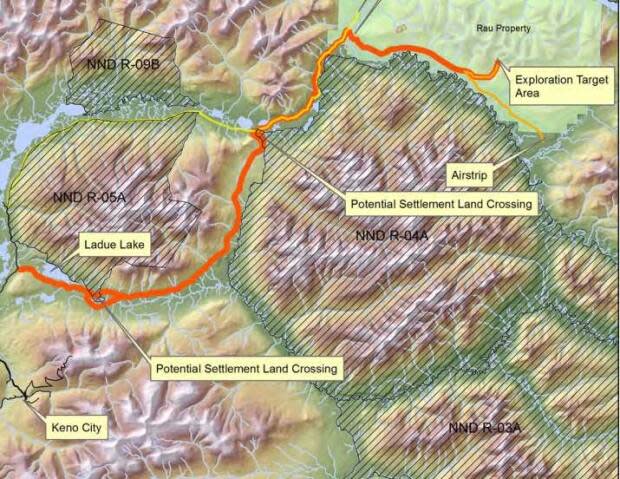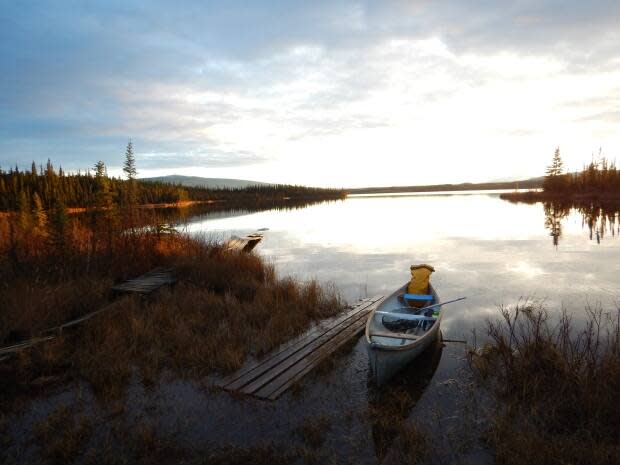Yukon rejects ATAC Resources application for mining access road
A mining company says it is questioning a decision by the Yukon government to reject its application to build an exploration road to one of its gold deposits in central Yukon.
ATAC Resources Ltd. has, for years, proposed bettering access to its Tiger Gold deposit, which is part of its larger Rackla Gold project north of Mayo.
The proposed 65-kilometre-long all-season road would overlap onto two existing trails, as well as 46 creek and river crossings in the Beaver River watershed, all within the traditional territory of the First Nation of Na-Cho Nyäk Dun.
Some Na-Cho Nyäk Dun citizens, as well as conservation groups and outfitters, have opposed the road, while ATAC has previously said the Tiger project would be unsustainable without it.
The Yukon Environmental and Socio-Economic Board (YESAB) recommended in 2018 that the project be allowed to proceed under close monitoring and other conditions.
However, ATAC said in a press release Nov. 30 that the Yukon government had recently rejected its construction application.
"We are extremely disappointed with, and surprised by this decision," ATAC president and CEO Graham Downs said in the press release.
"If this road can't be permitted following a positive environmental and socio-economic assessment decision and years of governmental encouragement to invest in the project, then you have to wonder if Yukon is in fact open for business."
Among the reasons given for the rejection, according to the press release, was "opposition expressed" by the First Nation of Na-Cho Nyäk Dun.
It adds that the company "does not agree with many aspects of the government's decision and, in consultation with its external legal counsel, is evaluating its options."
Na-Cho Nyäk Dun Chief Simon Mervyn Sr. did not immediately respond to requests for comment.

'Significant adverse impacts' not addressed, minister says
Questioned about the decision in the legislative assembly Monday afternoon, Yukon Energy, Mines and Resources Minister Ranj Pillai said that ATAC's application was rejected for two key reasons.
The application, he said, "did not demonstrate" how the company would appropriately mitigate the "significant adverse environmental and socio-economic effects" that had been identified during the YESAB process.
The First Nation of Na-Cho Nyak Dun had also identified a number of "significant adverse impacts" that allowing the project to proceed would have on citizens' treaty rights, Pillai said, including being able to use the land for hunting, fishing, trapping and other traditional activities.
"The Government of Yukon agreed with these concerns and determined the application did not appropriately or sufficiently indicate how these impacts would be mitigated," Pillai said.
He added that the government hadn't ruled out the road for good, and that ATAC could improve and re-submit its application.
"This is not a full stop on this," he said.

Chamber of Mines shocked, conservation organizations pleased
The Yukon Chamber of Mines, in a press release Monday afternoon, said it was "shocked and disappointed" after learning about the application's rejection.
President Ed Peart told CBC that the chamber needed to look at the decision more closely before making further comment.
"This has some pretty significant impacts that we have to review," he said. "This decision is extremely important to the mining industry in the Yukon and we have to take the time to be able to research this properly."
Some conservation organizations, however, were celebrating the news.
CPAWS Yukon conservation manager Randi Newton told CBC she "felt a lot of happy relief" when she saw ATAC's press release in the morning.
The organization has led a campaign to protect the Beaver River watershed, describing it on its website as an "unspoiled wilderness" that serves as a pristine habitat for moose, salmon and river otters, among other species, and an area which holds great significance for Na-Cho Nyäk Dun citizens.
The First Nation and Yukon government are currently in the process of developing a land use plan for the region.
"If this road had been built, it really could have opened up the Beaver River watershed, and actually the larger Stewart watershed, to just a network of development and roads," she said.
"All of that would have happened without asking if that's what the First Nation of Na-Cho Nyäk Dun or Yukoners wanted, so this decision really means that land-use planning can come first and people can set out a vision that's right for that region.
"And then, we can decide if development fits with that vision."
Yukon Conservation Society mining analyst Lewis Rifkind also said ATAC's press release came as a welcome surprise. He added that he was still waiting on more details about the decision, but that it appeared to be a victory.
"We're obviously quite pleased with the way things have turned out," he said.

